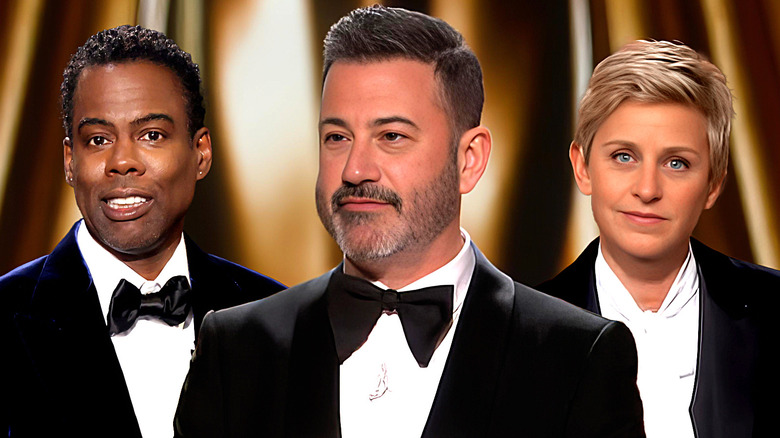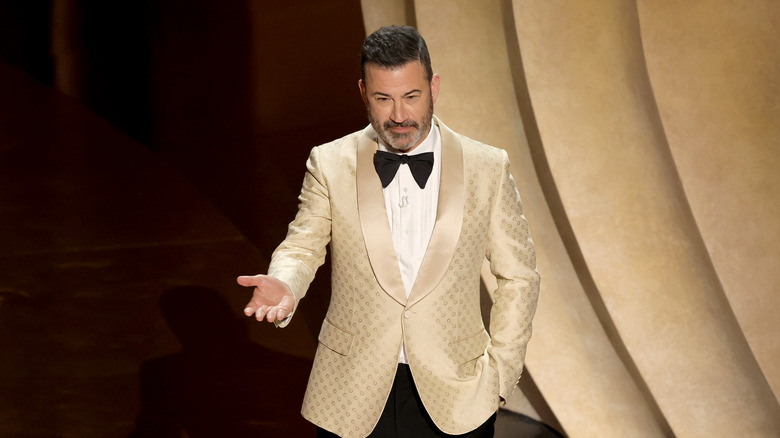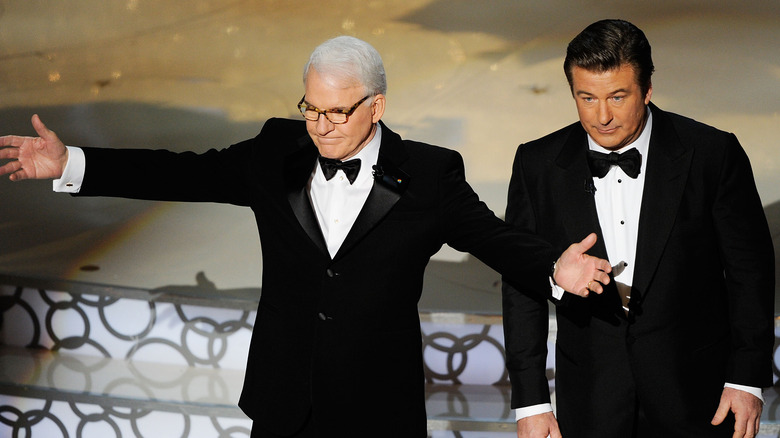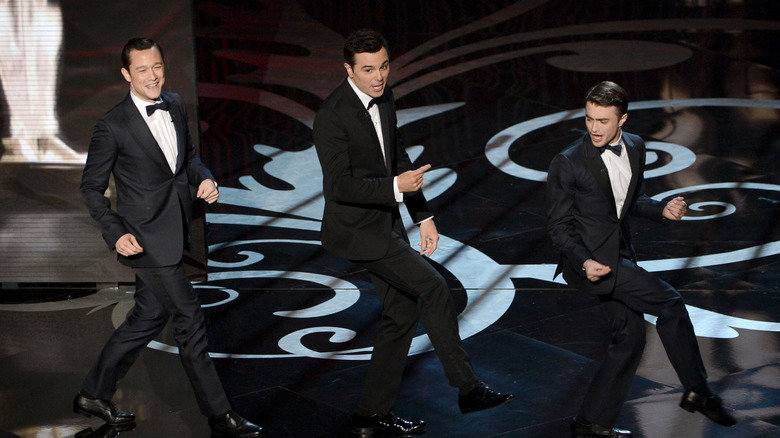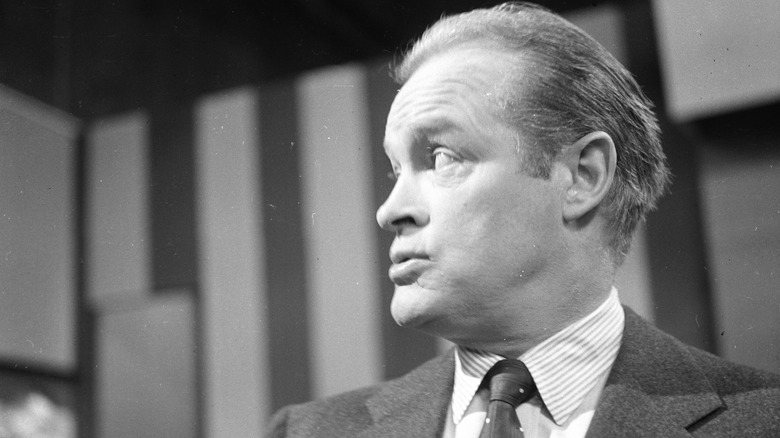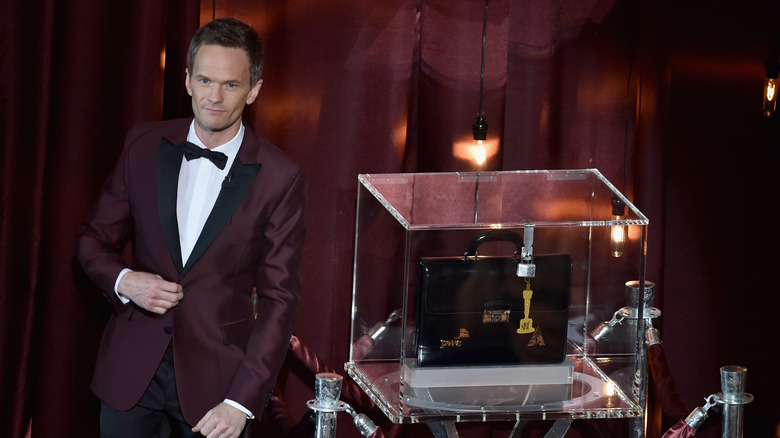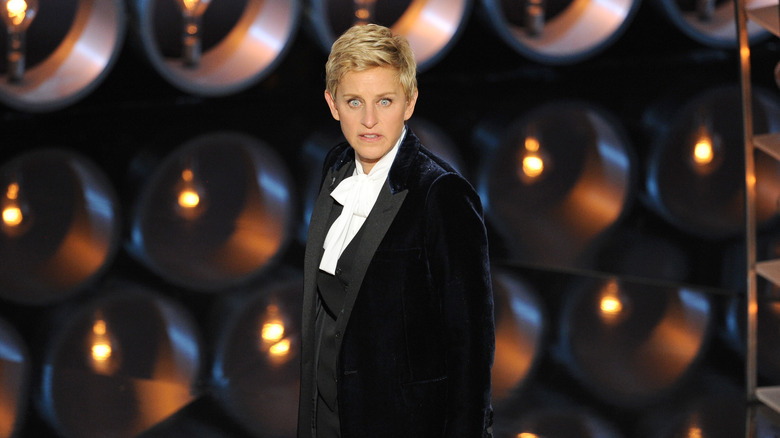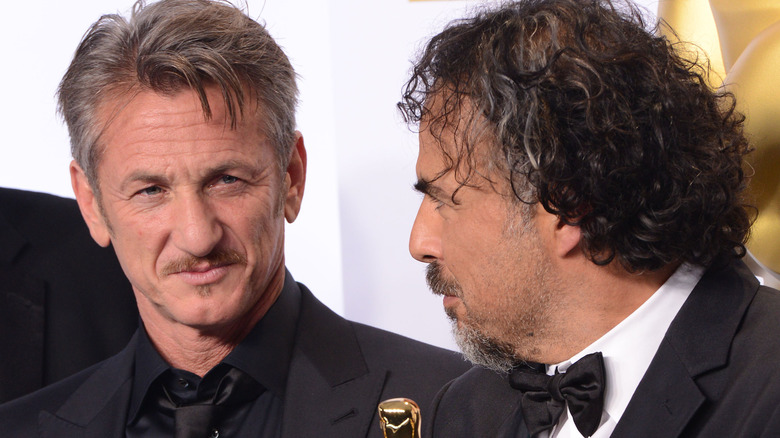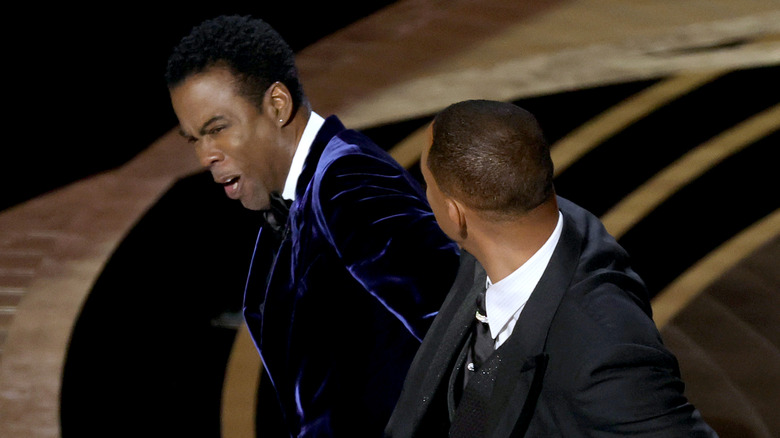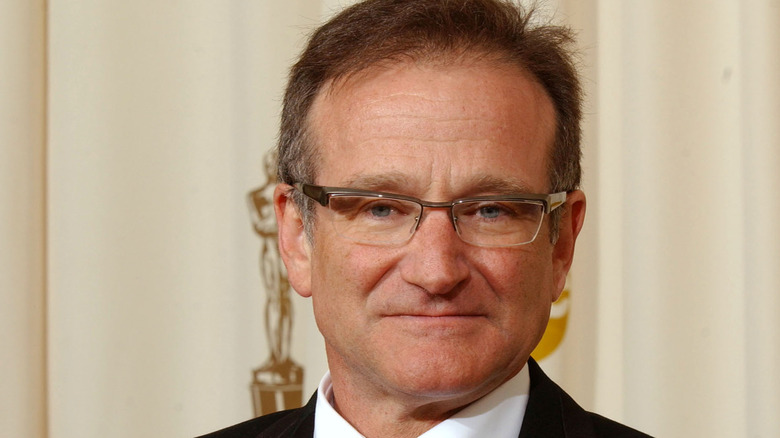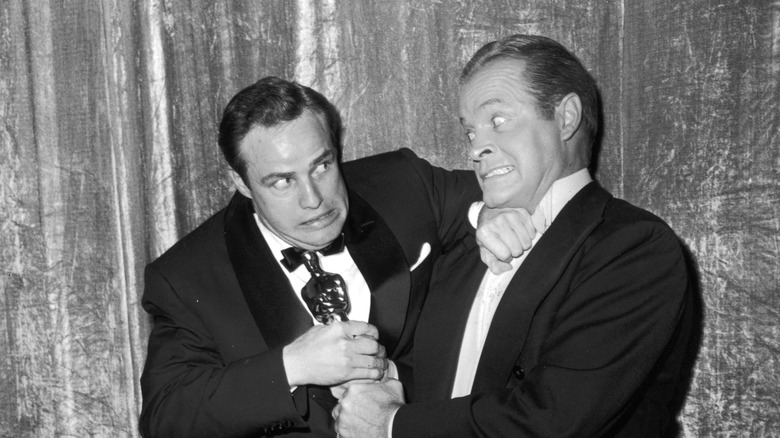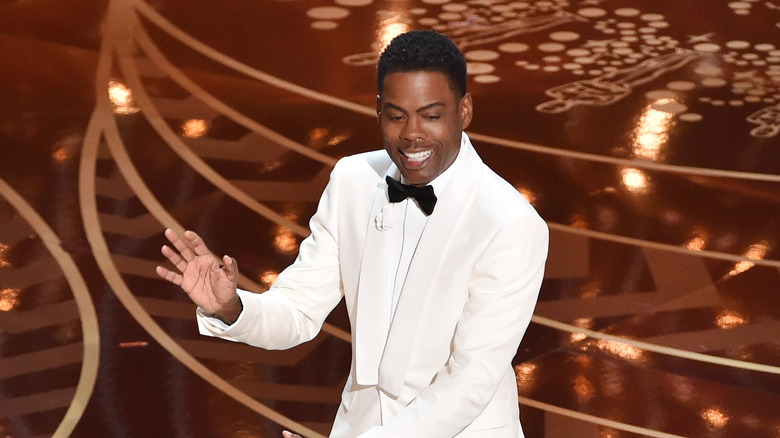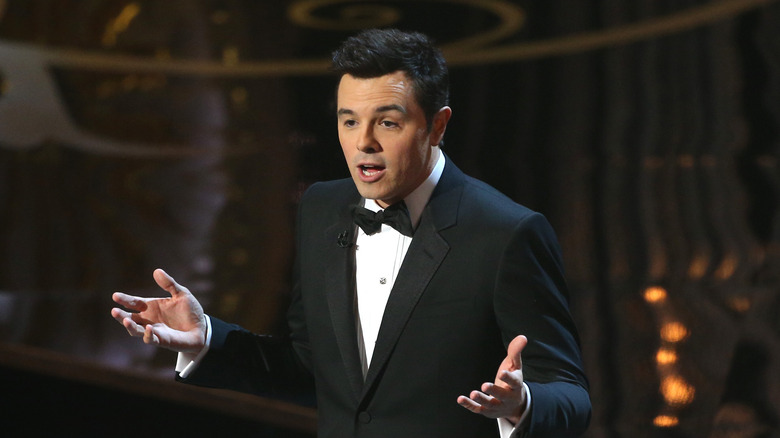The Most Controversial Oscars Jokes Of All Time
Another Oscars ceremony has come and gone, proving once more that Hollywood's biggest night is just as hard for the host as it is for those nominated. While most of the attention was directed at winners such as Emma Stone ("Poor Things") and pretty much everyone involved with "Oppenheimer," returning host Jimmy Kimmel attracted some negative attention for how he chose to comment on the night's events.
For better or (mostly) worse, the 96th Academy Awards brought back memories of years past — specifically those that gave us the sort of cringe-inducing jokes that only live television can provide. The specific jokes on this list were chosen not just or even necessarily because they were inherently offensive, but because they sparked significant uproar within audiences and the entertainment community. Special attention was paid to jokes that were perceived to be problematic after they first aired, which has predictably caused a heavy bias to those that occurred during the age of social media. Get your smelling salts ready — here are the most controversial Oscar jokes on record.
Jimmy Kimmel's lazy Poor Things joke drew a quick reaction from Emma Stone
The most recent example of Oscars jokes going viral for all the wrong reasons came at the 96th Academy Awards. Hosted once more by comedian and late-night talk show personality Jimmy Kimmel, fans were probably looking forward to the sharp yet safe jokes that have kept him on TV and out of headlines for most of his career. Critics, however, were likely bracing themselves for his usually immature perspective — but what they may not have seen coming was how quickly Kimmel's low-brow humor upset not just fans, but his celebrity target.
While introducing footage of Yorgos Lanthimos' pastel-gothic dramedy "Poor Things," Kimmel undercut the impressive visuals by cracking a joke about Emma Stone's sex scenes in the film. "Those were all the parts of 'Poor Things' we're allowed to show on TV," he mocked, intentionally or unintentionally tipping his comedic hat to countless online pearl-clutchers who have attempted to stoke moral panic over Lanthimos' and Stone's artistic choices. The actor (who won her second Oscar for "Poor Things" later in the evening) has been forced to spend a not-insignificant amount of time defending the sex scenes that apparently made co-star Mark Ruffalo nervous.
As such, it isn't hard to imagine she's tired of justifying something so innocuous — which would explain the loathing look she gave her husband following Kimmel's quip. The moment took the internet by storm, with some armchair lip-readers speculating that she called the host a "prick" under her breath.
Steve Martin invoked the Nazis for a hackneyed bit
One of very few actors whose careers were born from just one great scene, Christoph Waltz was swept from obscurity in the United States to the Academy Awards for his work in Quentin Tarantino's ahistorical World War II action film "Inglourious Basterds." From his first scene in the film, audiences could tell that Waltz had something special, making it not much of a surprise when the Academy nominated him for best supporting actor at the 82nd Academy Awards in 2010.
Unfortunately for Waltz — and everyone in attendance, in person or at home — the ceremony was hosted by both Alec Baldwin and Steve Martin, a comedic duo so mismatched they could only be superseded in their awkwardness by James Franco and Anne Hathaway a year later. Writing for The Guardian, journalist Marina Hyde hailed Baldwin and Martin as the worst hosts since David Letterman, and joked that "they couldn't hit a gag with a trunkload of IEDs" (the night's awards were largely swept by "The Hurt Locker").
One of the pair's most groan-worthy jokes was directed at Waltz — or, rather, directed at any Jewish person in the room, with Waltz used as a tacky justifier. Martin began, "In 'Inglourious Basterds,' Christoph Waltz played a Nazi obsessed with finding Jews. Well, Christoph..." he trailed off, gesturing at the audience, as the camera cut to Waltz and then filmmaker Ethan Coen — the latter of whom likely didn't expect his Jewishness to be the butt of a joke that's been tired since before Bob Hope referred to the Oscars as "Passover" in 1968.
Seth MacFarlane creepily reveled in female nudity through musical theater
If he isn't remembered for his work on "Family Guy," comedian and actor Seth MacFarlane should be infamous for his opening monologue at the 85th Academy Awards in 2013. This isn't just because it was particularly horrendous, but because he somehow managed to deliver some of the most juvenile humor in the show's history while simultaneously combining the two most annoying types of people you meet in college — frat bros and theater kids.
During the monologue (which was inexplicably structured around Macfarlane having a barely lucid conversation with William Shatner as Captain Kirk), the host is shown a potential "future" version of himself performing an opening musical number called "We Saw Your Boobs." The song essentially lists off every female actor who chose to do a nude scene that year.
Amy Davidson of the New Yorker passionately criticized the song and condemned the entire program as "The Oscars' Hostile, Ugly, Sexist Night." Despite backlash, MacFarlane revealed in 2019 that he was actually invited to host again in 2014, but was too busy filming "A Million Ways to Die in the West" to accept. However, he still defends "We Saw Your Boobs" not as something he thought was genuinely awards worthy, but as a comment on the crass song-and-dance number he was expected to do.
Bob Hope opened the ceremonies in a dark way
Admittedly, some readers will likely roll their eyes at the inclusion of Bob Hope on this list. The legendary comedian hosted the Oscars a staggering 19 times between the years 1953 (the first time the ceremonies were broadcast on television) and 1978 (the 50th anniversary of the Academy Awards), providing an unusually large amount of material for us to scrutinize from a time when comedic sensibilities were very different. However, certain subjects were deemed dark and controversial to joke about even in Hope's time — like, for example, suicide.
During his opening monologue at the 27th Academy Awards in 1955, Hope welcomed the audience by explaining how the evening would pan out. "The winners will of course take home an Oscar," he began. "The losers will all be presented with monogrammed do-it-yourself suicide kits." The line is obviously a bleak attempt at dark humor. Whether Hope knew or not, however, it likely carried extra weight for at least one audience member in particular — the late Judy Garland. At the time of the ceremony, Garland had allegedly attempted death by suicide on two separate occasions, and made more attempts afterwards (per Gerold Frank's biography "Judy").
At the 27th Oscars, she received her first and only nomination for best actress for her role in the film "A Star Is Born," but ultimately lost to Grace Kelly. Suffice it to say, the joke was ill-conceived at best.
If you or someone you know is struggling or in crisis, help is available. Call or text 988 or chat 988lifeline.org
Neil Patrick Harris chose the wrong audience participant
Though he's often righteously overlooked in a sea of bad Oscars hosts, it's worth noting that Neil Patrick Harris' one-time stint was a legendary misfire in and of itself. Harris hosted the 87th Academy Awards in 2015 — arguably a pivotal time in his life, as the former "Doogie Howser, M.D." star was enjoying a career renaissance brought on by his breakout role in "How I Met Your Mother."
But if hosting the Oscars was meant to launch his career to the next level, it certainly didn't pan out that way. Harris's Oscars were uniquely awkward, the host emanating obvious and constantly growing anxiety as Twitter ripped his work to shreds in real-time. One strong point of contention among the online masses was his choice to task Octavia Spencer with watching a briefcase (a prop in a perplexingly drawn-out magic trick joke) for the entire evening. Given that the year's lack of diverse nominations had already inspired the enduring hashtag movement #OscarsSoWhite, Harris roping a woman of color into a somewhat embarrassing supporting act rubbed many viewers the wrong way. When it came time for the host to execute the joke trick at the end of the show, he seemed visibly uncomfortable and anxious to get through it as quickly as possible.
Did bombing in front of the film industry's best and brightest hurt his movie star trajectory? Maybe. All we know is that, following the 2015 Oscars, Harris suddenly went from appearing in multiple movies a year to doing not much at all until 2017's "Downsizing."
Ellen DeGeneres insulted Liza Minnelli's appearance
Before Ellen DeGeneres earned a swift and deadly reputation as the daytime talk show Queen of Mean (with declining goodwill and allegations of workplace misconduct potentially being the real reason her show ended after 19 seasons), she was a respected cultural icon who made perfect sense as an Oscars host. To this day, she is often counted among the best to do the job, with her famous selfie of Hollywood stars remaining one of the most memorable Oscars moments in history.
That doesn't mean the entire ceremony was a home run. After noting that the real-life subjects of the films "Philomena" and "Captain Phillips" (both nominated for best picture) were in attendance, she dryly added, "And I have to say one of the most amazing Liza Minnelli impersonators I have ever seen in my entire life." The camera then cut to the real Minnelli, who was there to commemorate the 75th anniversary of "The Wizard of Oz." As Minnelli seemed to scoff slightly toward her seatmate, DeGeneres further prodded, "Good job, sir." Speaking to TMZ after the show in an impromptu interview, the renowned performer felt the joke went "a little astray."
"I think she thought it would be funny," Minnelli told the outlet. "But she never stopped after she said it and said, 'My friend, Liza Minnelli.'" In a later interview, she elaborated that she was most hurt by DeGeneres jokingly questioning her gender, and reiterated that she was surprised her friend didn't end the bit by announcing her presence warmly.
Someone thought it was a good idea to have Sean Penn present Best Picture in 2015
Even back in 2015, Sean Penn was well-known as a controversial figure in Hollywood, whose admirable humanitarian efforts were offset by his history of physically assaulting photographers and journalists (just one of the many reasons why you don't see Penn acting that much anymore). All this to say, Penn was not someone with a reputation for controlling his impulses, so one can only imagine why the Academy thought it would be a good idea to have him present the final award at the 87th Oscars ceremony.
For the most part, the actor was subdued and unremarkably serviceable as a presenter — until he opened the envelope and let his intrusive thoughts win. Veering way off script to celebrate the success of Mexican director Alejandro G. Iñárritu's film "Birdman," Penn exclaimed, "Who gave this son of a b**** his green card?!"
The joke almost immediately received backlash online, with many perceiving it to be racist and diminishing toward Iñárritu's accomplishment. However, some noted that Penn and Iñárritu had been friends for over a decade, since working together on Iñárritu's second feature film "21 Grams." Iñárritu himself defended the joke to reporters, telling Variety, "Sean and I had that kind of brutal relationship where only true friendship can survive. When I was directing him in '21 Grams,' he was always making jokes ... I made a lot of very tough jokes (to him) that I will not tell you. I didn't find it offensive, I thought it was very funny."
Chris Rock's dig at Jada Pinkett Smith led to the legendary slap
The infamous altercation — in which Academy Award winner Will Smith struck comedian and host Chris Rock — was instantly logged as one of the most shocking moments captured on live TV, and has since been (hyperbolically) likened to the Challenger explosion and the assassination of Lee Harvey Oswald.
Ridiculous comparisons aside, the slap was a fairly historic moment in entertainment history, made all the more confounding by the fact that it spun out of one of the dumbest Oscars jokes ever. Rock, referencing Jada Pinkett-Smith's bald head (caused by alopecia), mockingly compared her to "G.I. Jane." Will Smith — who first seemed to laugh at the joke as his wife rolled her eyes — stormed the stage, slapped the host, and went back to his seat to scream at Rock as the latter tried to play the situation off.
Smith apologized afterward and resigned from the Academy, which subsequently banned him from the ceremony for a period of 10 years. Rock, meanwhile, basically wrote a Netflix stand-up special around the incident, which was ultimately panned by critics for belaboring tired, half-baked opinions about cancel culture.
Jane Fonda set Robin Williams up for a horribly racist impression
It's heartbreaking to have to include the late Robin Williams on this list — but as a prolific comedian whose career predated most mass revelations about what one should or shouldn't do for a joke, he's bound to have a few stinkers in his repertoire. One in particular can be found in a clip from the opening of the 58th Academy Awards, which Williams hosted in 1986 alongside Jane Fonda and Alan Alda.
While welcoming audience members from every corner of the world, Williams puts his admittedly impressive accent work to the test and greets the audience in different languages. This comes to a screeching halt, however, when Fonda gives a special shout-out to the Philippines, prompting Williams to do his version of a Filipino greeting — which, apparently, is speaking in a thick accent and shouting at someone unseen to buy shoes from him.
Though it was met with riotous laughter from the mostly white in-person audience, The Hollywood Reporter has since ranked it among the most problematic jokes in the history of the ceremony. It also feels particularly cruel since the Philippines has never been nominated for best international feature film, despite submitting works from their country 34 times.
Bob Hope makes light of Marlon Brando's Oscars protest
If there was one group of people Bob Hope's Oscars material liked to target, it was Indigenous Americans. The Oscars have a frustrating history of overlooking Indigenous artists and their achievements, an issue that has returned to the forefront of the conversation this year due to Lily Gladstone ("Killers of the Flower Moon") being the first Indigenous person to be nominated for best actress. In 1973 at the 45th Academy Awards, Marlon Brando refused to attend the ceremony or accept the award for best actor ("The Godfather"), and instead sent Indigenous activist Sacheen Littlefeather in his place to speak briefly about the mistreatment of Indigenous people in America.
Two years later, when Brando was presumably invited once more due to the nomination of "The Godfather Part II" in several categories, Hope joked that Brando couldn't make it because Indigenous people were "holding him for the balloon payment. He gave them a little land with a mortgage on it." At the 1960 ceremony during an actors' strike, he also joked that there were 150 Indigenous extras "crouched behind a boulder at Corganville, and no one has told them that John Wayne isn't coming."
Chris Rock hired child actors to unwittingly play racist stereotypes
In terms of Chris Rock's Oscars jokes, the "G.I. Jane" bit was actually fairly tame. More controversial by far was a more elaborate gag he orchestrated for the 88th Academy Awards in 2016, in which he turned three kids into the unwitting punchlines of a racist joke. "The results of tonight's Academy Awards have been tabulated by the accounting firm of Price, Waterhouse, and Cooper," the comedian began. "They sent us their most dedicated, accurate, and hard-working representatives. I want you to please welcome Ming Zhou, Bao Ling, and David Moskowitz."
The "joke" was taken as an obvious reference to the stereotype that Asian Americans are all good at math, with a bit of age-old casual Hollywood antisemitism thrown in for good measure. Among those upset by Rock's bit were Constance Wu and director Ang Lee. According to one of the children's mothers, neither the kids nor their parents were informed about the content of the bit until after they had already signed contracts and begun rehearsals.
Seth MacFarlane mocks domestic abuse with Chris Brown/Rihanna joke
Chris Rock, Bob Hope, Jimmy Kimmel, and even Robin Williams have all told multiple jokes at the Oscars that could be deemed problematic — after all, each of them hosted the ceremony at least twice. This makes it almost impressive that Seth MacFarlane managed to land two spots on this list despite having only been the host once.
Yes, during the very same show he opened with "We Saw Your Boobs," MacFarlane delivered several disappointing duds, but none were quite as upsetting as his breezy reference to Chris Brown's horrifying abuse of his then-girlfriend Rihanna. In 2009, Brown pled guilty to felony assault after attacking Rihanna the night before the Grammy Awards earlier that year. She suffered multiple bruises from his actions, as well as a split lip.
MacFarlane brought up the event at the Oscars while describing Quentin Tarantino's "Django Unchained." "This is the story of a man fighting to get back his woman who has been subjected to unthinkable violence," said MacFarlane. "Or as Chris Brown and Rihanna call it, a date movie." He was met with scattered laughs and a few boos from the crowd, and — though he managed to wrestle the crowd back on his side quickly enough — viewers at home were left stunned and disgusted by the tasteless remark. To this day, it remains one of the most controversial Oscars jokes ever told.
